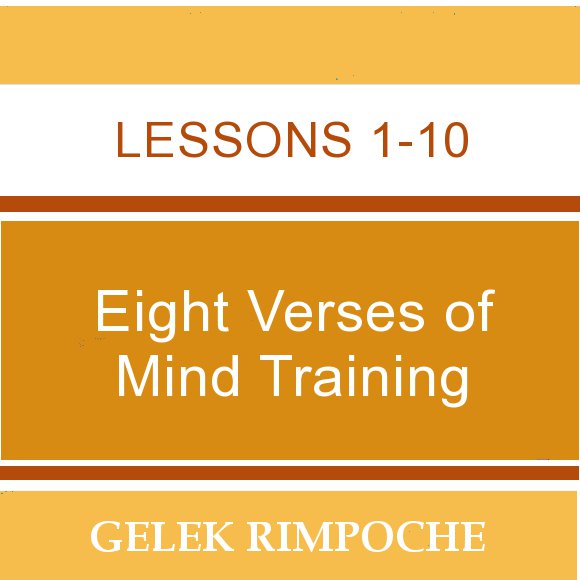Eight Verses of Mind Training


Lesson 1: Eight Verses of Mind Training
Lesson Number 1 of 10
In this lesson Gelek Rimpoche discusses his connections to Chögyam Trungpa Rinpoche and their connection to the establishment of Buddhism in America. Rinpoche also gives an overview of lojong or mind training, as taught by the Tibetan lamas of the Kadampa tradition, particularly Langri Tangpa, the author of the 8 Verses of Mind Training.

Lesson 2: Eight Verses of Mind Training
Lesson Number 2 of 10
Compassion is widely accepted in society as a virtue. What is the difference between “our” compassion, and the Buddha’s compassion? Gelek Rimpoche in this lesson delves deeper into the meaning of greater compassion.

Lesson 3: Eight Verses of Mind Training
Lesson Number 3 of 10
“If you don’t know how to help yourself, you can’t help others.” In this lesson Gelek Rimpoche explains that we must have compassion for ourselves and that can only take place by understanding the reality of our situations of suffering. Rimpoche also discusses unlimited love and compassion as two aspects of one mind.

Lesson 4: Eight Verses of Mind Training
Lesson Number 4 of 10
In this lesson Rimpoche explains bodhimind, the unlimited love and compassion, and lojong, the training in how to achieve bodhimind. Rimpoche takes audience questions: How can self-criticism be helpful? How does my own enlightenment help others?

Lesson 5: Eight Verses of Mind Training
Lesson Number 5 of 10
Contemplation of suffering generates the enthusiasm to attain enlightenment. According to Gelek Rimpoche Tibetan Buddhism teaches the ways to reach enlightenment—potentially in one lifetime—but it requires the enthusiasm that comes from compassion for oneself.

Lesson 6: Eight Verses of Mind Training
Lesson Number 6 of 10
In this lesson Gelek Rimpoche discusses Verse 2 of Langri Tangpa’s 8 verses, which recommends to view oneself as inferior and others as superior. Although Rimpoche notes that this may run contrary to modern psychology, he states that it is necessary to defeat our innate orientation of thinking of ourselves as the most important.

Lesson 7: Eight Verses of Mind Training
Lesson Number 7 of 10
In this lesson Gelek Rimpoche discusses Verse 2 of Langri Tangpa’s 8 verses, which recommends to view oneself as inferior and others as superior. Although Rimpoche notes that this may run contrary to modern psychology, he states that it is necessary to defeat our innate orientation of thinking of ourselves as the most important.

Lesson 8: Eight Verses of Mind Training
Lesson Number 8 of 10
In this lesson Rimpoche explores the difference between pure love, and attachment or obsession (the “sticky stuff”). He recommends starting with a personalized, pure love toward those closest to us, then expanding this to include more beings. “Without love, compassion is a little dry.”

Lesson 9: Eight Verses of Mind Training
Lesson Number 9 of 10
Learning from mistakes is critical for spiritual development. A “learning experience” is useless if you have the same learning experience repeatedly. Rimpoche explains verse 3 of Langri Tangpa’s text that deals with forcefully and immediately dealing with afflictions. Meditation is used to personalize what one learns, and effect personal change.

Lesson 10: Eight Verses of Mind Training
Lesson Number 10 of 10
In this lesson Gelek Rimpoche discusses the remaining verses of Langri Tangpa’s text with themes that include treasuring the usefulness of suffering and those who inflict it on us, being able to practice patience in the face of adversity, and being happy to accept difficulties while offering benefit to others.

